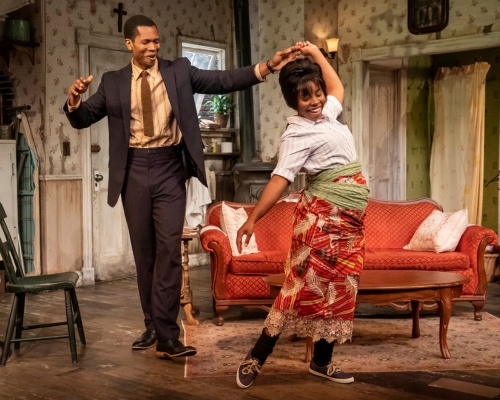The Enduring Legacy of A Raisin in the Sun
On January 19, 1959, a few months before A Raisin in the Sun opened on Broadway, Lorraine Hansberry was in the Taft Hotel when she wrote a letter to her mother, Nannie Perry Hansberry, detailing her ambitions for the new play: “Dear Mother, Well – here we are. I am sitting alone in a nice hotel room in New Haven, Conn. Downstairs, next door, in the Shubert Theatre, technicians are putting the finishing touches on a living room that is supposed to be a Chicago living room. Mama, it is a play that tells the truth about people, Negroes and life and I think it will help a lot of people to understand how we are just as complicated as they are—and just as mixed up—but above all, that we have among our miserable and downtrodden ranks—people who are the very essence of human dignity. That is what, after all the laughter and tears, the play is supposed to say. I hope it will make you proud. See you soon. Love to all.”

When Hansberry wrote to her mother and witnessed the play’s success, including a 1961 film adaptation, one can only imagine if she anticipated its enduring legacy. A Raisin in the Sun remains among American theatre’s most produced and studied plays. It was revived on Broadway in 2004 and again in 2014. In 2022, the play was produced Off-Broadway. The film version was also remade twice: first in 1989 and then in 2008, with distinguished actress Phylicia Rashad as Lena Younger. Undoubtedly, Hansberry has impacted American theatre, culture, and politics, thus prompting renewed interest in her works. As such, several scholars and critics continue to document her efforts, most recently in studies by Soyica Diggs Colbert, Imani Perry, Charles J. Shields, and Isaiah M. Wooden.
Writer Imani Perry remarks that Lorraine Hansberry believed sincerely that “great art required one to say something about society.” Commencing with A Raisin in the Sun, Hansberry used her dramas to discuss issues affecting the most marginalized, nationally and abroad. However, Hansberry is one of the greatest American playwrights precisely because her works are not overly didactic. Instead, she invites viewers to be informed of a social message while simultaneously being highly entertained. This very quality of Hansberry has inspired a cadre of contemporary playwrights to take up the mantle and write with a commitment to social action and highlight “the very essence of human dignity.”
Kwame Kwei-Armah’s Beneatha’s Place is one such play (in which I served as assistant dramaturg). Premiering in 2014 for Baltimore Center Stage’s The Raisin Cycle, Kwei-Armah’s play picks up where Hansberry left off in Raisin. In doing so, Beneatha’s Place extends the conversation about colonialism’s impact at home and abroad, the necessity of Black internationalism, and the effects of structural imperialism on familial communities and other institutions, including academe. One could even argue that Beneatha’s Place – set in Lagos, Nigeria – has a greater connection to Hansberry’s Les Blancs (1970), precisely because both plays deal with the resistance to institutional racism on the continent of Africa.
Other plays that revel in Hansberry’s legacy—specifically those that explore themes of home and neighborhood integration, heritage, and the American dream—include Younger by Kelundra Smith, The Etiquette of Vigilance by Robert O’Hara, Living Green by Gloria Bond Clunie, Neighbors by Branden Jacobs-Jenkins, and Bruce Norris’s Clybourne Park (which was produced in repertory with Beneatha’s Place at Baltimore Center Stage). The last four titles were published as a collection, Reimagining A Raisin in the Sun (edited by Harvey Young and Rebecca Rugg), thus confirming the enduring legacy of Hansberry’s groundbreaking drama.
These plays acknowledge the importance of legacy. This is especially poignant in Younger, which examines the life of Lena Younger years before we meet her in Raisin, and The Etiquette of Vigilance, which explores the adult life of Travis Younger fifty years after A Raisin in the Sun premiered.
Collectively, these playwrights have elaborated on topics initiated by Hansberry, making her play even more relevant today. These topics include the Great Migration, racial covenants and housing segregation, generational differences, perspectives on gender and the role of women within a changing society, and gentrification and economic deprivation, particularly for African Americans who still find themselves pondering the notion of home and the American dream.